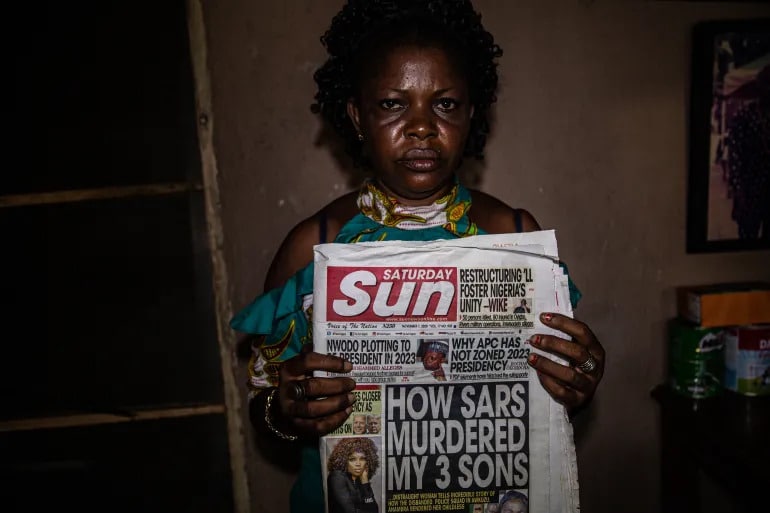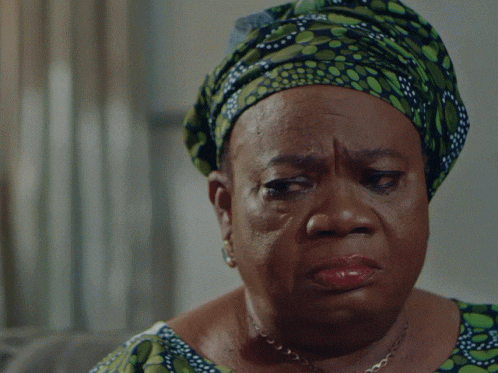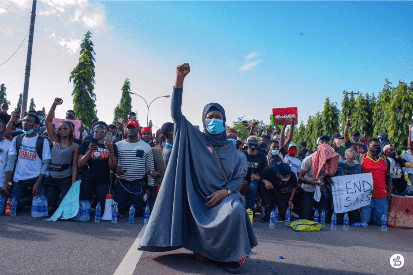If you are Nigerian living in Nigeria and you have never been a victim of police brutality, then you don’t know what God has done for you.
Even if you have not been a victim, then you must have heard of how the Nigeria Police Force treats Nigerian citizens cruelly. Many have lost their lives, families, dreams, hopes, and aspirations to the brutish behavior of law enforcement personnel.
Some do not even know if their kids are alive after they have been carted away as criminals with no proof.
Instances of police brutality in Nigeria
Police brutality comes in different forms. It ranges from extrajudicial execution, organ harvesting, torture, rape, physical assault, harassment, extortion, excessive use of force, abduction, unlawful arrest, illegal detention, and all forms of human rights abuses.
The most common is the unlawful killing of innocent Nigerians.
SEE: Black Tax: Everybody Must Pay It
Tina Ezekwe, a 16-year-old secondary school student, died after a police officer shot her in the Iyana-Oworo area of Lagos. The incident occurred after the officer shot to disperse a crowd in the wake of a shooting of a commercial bus driver who refused to pay a bribe.
This is not the first time someone has lost their life to a trigger-happy policeman.
Another example of this is Mrs. Ukamaka Obasi, a native of Onueke in Ezza South Local Government Area of Ebonyi State. She lost three of her sons to police brutality within three years.

In July 2012, the Special Anti Robbery Squad (SARS) operatives in Anambra state carted her son away after accusing him of belonging to the Movement for the Actualization of the Sovereign State of Biafra (MASSOB). There was no trial, and they executed him without bail three weeks later.
They arrested her second son Obiora on similar allegations in August 2013, and executed him in the same way. Her last son, Chibuike was about 18 years old when he was accused of armed robbery. He was arrested and executed without trial in August 2014.
Mrs. Obasi still hasn’t gotten justice for any of them.
This is not the worst of them, however, as there is an adage that says “A dead child is better than a lost child”. Such is the case of Chijioke Ilonya, a 20-year-old young man whom SARS arrested in November 2012 on his way back from a party.
His parents went to the station to bail him out. There they met James Nwafor, the Chief Superintendent of Police, who told them to their face that Chijioke had been killed and there was nothing they could do about it.
They thought it was a joke since it had only been a few days and there was no evidence, trial, or bail. Since then, the family has been looking for him. They have gone to different police stations and spent millions of Naira paying different police officers who would ask for huge amounts of money but to no avail.
To date, we do not know where Chijioke is, and the officer in charge of arresting him is walking freely with no sanctions.
The Lashback
On October 3, 2020, near the Wetland Hotel at Ughelli, Delta State, police officers shot a young man. They took his white Lexus SUV and drove off with it, leaving him for dead.
He survived the attack, but the incident went viral on video and triggered a nationwide protest.
It was the biggest organized demonstration in Nigeria. Almost like someone lit a fire, and all of the youths caught it.
The EndSARS Movement
It was righteous anger. People were willing to close down their businesses. They did not mind losing their jobs and giving their time, money, and energy to fight for this cause. There was no apparent leader, just youths mobilizing themselves to fight for their lives.
Nigerian youths came together irrespective of language, religion, and background to face a common enemy.
Brutality at the hands of law enforcement agents.
Social media was a strong tool in this protest since it was the only tool the government could not control. Other nations of the world supported the youths, and the government found themselves in a tight position.
On October 11, 2020, the Nigerian government announced the disbandment of SARS.

This announcement generated mixed feelings, since all they did was absolve the officers in question into the larger police force. It was simply a case of “same people, different uniforms”, and they were still at large taking bribes and extorting people.
This pushed the demonstrators to reiterate their demands, urging the president and police hierarchy to not just #EndSARS. They asked them to also put an end to police brutality in Nigeria and implement changes to affect all ranks of police officers.
SEE: The Rash Called Political Thugs in Nigeria
The protesters also demanded the complete dissolution of SARS as a unit, and the prosecution of all criminal officers. Additionally, they demanded compensation for victims of police violence.
Of course, the government ignored these demands. There was no remanded police officer, and the protesters intensified their efforts to get justice for the victims.

This resulted in the biggest massacre a country can commit against its citizens.
Lekki Toll Gate Massacre
On the 20th of October, 2020, the government announced a state of emergency. Many protesters refused to leave in different parts of the country, especially at the Lekki toll gate.
Military personnel proceeded to surround the peaceful protesters. Using the “kettling” strategy – a kind of detention to keep a group of individuals confined to a certain area – to encircle the protesters, the soldiers fired in the air and at the crowd.
Many sustained injuries, with about 12 reported dead. And despite calls for justice, there is no news of punishment for any officer. In fact, the government denies the act to date.
Two years later, and police brutality in Nigeria is still very much around. Like a panther, it faded into the shadows for a while, then slowly crawled out when the dust settled.
We still have cases of excessive force, manipulation, kidnapping, and bribery. Families of the victims have received no compensation or justice, including those who died at the Lekki Toll Gate.
This is the country we live in.





